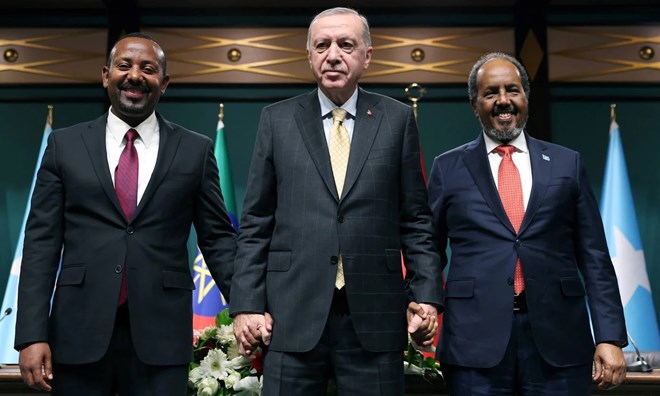
Friday December 13, 2024
By Ragip Soylu in Ankara
Seven-hour negotiations in Ankara produced a joint statement that satisfied Mogadishu

Ethiopian Prime Minister Abiy Ahmed (left), Turkish President Recep Tayyip Erdogan (centre) and Somali President Hassan Sheikh Mohamud pose after signing the Ankara Declaration on 11 December in Ankara (Turkish Presidency/Handout)
When Somali President Hassan Sheikh Mohamud and Ethiopian Prime Minister Abiy Ahmed met in Ankara on Wednesday, expectations from their Turkish hosts were high.
The Turkish government had been attempting to mediate the sea port crisis between the two countries for almost a year through two rounds of negotiations, but no tangible progress had been made beyond vague statements of goodwill.
Mogadishu has been demanding that Ethiopia cancel a memorandum of understanding (MoU) it signed with Somalia's breakaway northern region of Somaliland in January. This agreement aimed to grant Ethiopia port access through Somaliland's coastline for the next 50 years.
Somalia viewed the MoU as a potential recognition of Somaliland as a sovereign state and threatened war to protect its territorial integrity. Ethiopia, in contrast, argued that as a landlocked country, it had a right to sea access under international law.
“You won’t leave this room until you reach a deal,” Turkish President Recep Tayyip Erdogan said during the negotiations, according to a person familiar with the issue speaking to Middle East Eye.
Erdogan, who has known both leaders for years, has invested heavily in Somalia since 2011. Turkey has established a military base in the country, trained thousands of Somali soldiers, managed Mogadishu’s airport and port, and provided extensive humanitarian and military aid.
In 2021, Erdogan’s decision to sell Turkish armed drones to Abiy tipped the balance of Ethiopia’s civil war against the Tigray forces in Abiy's favour.
Sticking point
A Turkish official stated that the negotiations between the two leaders and their respective teams lasted nearly seven uninterrupted hours, with Erdogan and Turkish Foreign Minister Hakan Fidan actively participating.
According to a source familiar with the talks, one of the key sticking points was Ethiopia's recognition of Somalia's territorial unity. This recognition would effectively require Ethiopia to cancel its MoU with Somaliland.
The source added that while Abiy was willing to sign a statement committing to Somalia’s independence and sovereignty, he resisted any mention of “territorial integrity” or “unity”.
The Somali delegation countered by referencing the 1933 Montevideo Convention, which codifies international legal norms and principles regarding statehood. One of its key criteria for statehood is the possession of a “defined territory”.
“You cannot say you recognise a country but deny that it has a defined territory,” the source explained.
Turkish officials found this argument persuasive, concluding that Ethiopia must either recognise Somalia in its entirety under international law or not at all.
Hours of negotiations later, Somalia and Ethiopia finally reached a final agreement, known as the Ankara Declaration, that addressed the core demands of both. Somalia secured Ethiopia’s recognition of its territorial unity, while Ethiopia was granted commercial access to the Somali coastline.
The declaration also stipulated that technical delegations from both nations, facilitated by Turkey, would begin negotiations no later than February 2025, with a deadline to complete the talks within four months. Turkish officials hailed the deal as a victory for both sides.
'Win-win agreement'
Ebuzer Demirci, a regional expert, noted that Somalia has emerged as achieving several deals.
“Somalia, earlier this year, signed a comprehensive naval and energy deal with Turkey to guard its waters and establish a naval force with Ankara’s help,” Demirci said. “Mogadishu leveraged the Somaliland MoU to its advantage.”
The reasoning behind Abiy's concessions may be twofold.
Tom Gardner, an Africa correspondent for The Economist, suggested that Abiy was under significant diplomatic pressure from the United States to resolve the crisis.
“The US is concerned about the implications for security and peacekeeping in Somalia, particularly in the fight against al-Shabab [an al-Qaeda-affiliated militant group],” Gardner explained, noting that Ethiopia is a key contributor to African peacekeeping forces.
Under the new deal, Somalia confirmed that Ethiopian troops would remain in the country.
The situation was further complicated by Somaliland’s recent presidential elections, which shifted the political landscape. Somaliland’s new president, Abdirahman Mohamed Abdullahi, is reportedly less amenable to Abiy than his predecessor.
“Somaliland senses it might get a better offer, possibly in the form of recognition from the next US administration,” Gardner added. The news website Semafor reported this week that the incoming Donald Trump administration is already considering recognising the breakaway state.
Some analysts argue that Abiy achieved his primary objective, as he has long sought to address Ethiopia’s landlocked status. By triggering the crisis, he forced the issue to the forefront and secured a deal granting Ethiopia access to the Somali coast.
“It’s a sort of win-win agreement,” said Omar Mahmood, a senior analyst for Eastern Africa at Crisis Group. “This deal still provides Abiy Ahmed with access to the sea, and it makes sense for the Ethiopian market to be connected to the Somali coast.”